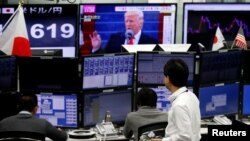With President Donald Trump’s emphasis on “America First” economic policies, Japan and South Korea are bracing for contentious negotiations over trade and defense sharing costs.
In his inauguration address on Friday, President Trump said he would enact protectionist policies to end free trade practices that he said had caused the U.S. economy to decline while enriching foreign industry.
“We must protect our borders from the ravages of other countries making our products, stealing our companies, and destroying our jobs. Protection will lead to great prosperity and strength,” Trump said in his inaugural address.
The White House also issued a statement that the U.S. would renegotiate the North American Free Trade Agreement (NAFTA), which was signed in 1994 by the United States, Canada and Mexico.
President Trump is also expected to withdraw from the Trans Pacific Partnership (TPP) free trade agreement that has yet to be ratified. The TPP includes the U.S., Japan and 10 other Pacific Rim countries that account for 40 percent of the world’s economy.
Leaders in Asia reacted with caution on Monday to Trump’s tough talk on trade.
Japan
Japan’s Chief Cabinet Secretary Yoshihide Suga told a news conference that Tokyo wants to further deepen economic ties with Washington.
But Tokyo shares fell on Monday morning, signaling a negative Japanese market reaction to Trump's inauguration speech.
Japan's Parliament ratified the TPP on Friday, the day President Trump took office. Prime Minister Shinzo Abe has said without U.S. participation, the pact would become “meaningless.”
Abe had sent a congratulatory message to President Trump after he was sworn in, saying he looks forward to working hand in hand with the new president to ensure the peace and prosperity of the Asia-Pacific region.
The Japanese Foreign Minister Fumio Kishida said efforts are underway to arrange a meeting soon between Abe and Trump, so that the Japanese leader can stress the importance of the TPP pact.
Over 1,000 Japanese companies also have operations in Mexico that export to the U.S., and that could suffer from any changes in NAFTA.
Japanese business leaders have voiced concern that U.S. protectionism will lead to a global economic downturn.
“A protectionist approach, such as quitting the Trans-Pacific Partnership (TPP) and renegotiating the North American Free Trade Agreement (NAFTA), will have a significant negative impact on the world economy,” said Akio Mimura, chairman of the Japan Chamber of Commerce and Industry, in a written statement on Saturday
South Korea
South Korea is not a member of the TPP but does have a free trade agreement (FTA) with the U.S. that Trump also criticized during the campaign. Some American companies have complained that South Korea tries to get around the FTA by imposing excessive and confusing non-tariff regulations on U.S. imports.
On Monday South Korea's Acting President and Prime Minister Hwang Kyo-ahn said his government has been in contact with the Trump administration to reassure them that they are living up to their end of the agreement.
“We are fully explaining the mutual benefits and the contributions we have been making to South Korea and U.S. relations, to persuade them. So we will continue our efforts to improve the relationship through cooperation,” said Acting President Hwang during a press conference.
Defense costs
In his inaugural address President Trump also vowed to change U.S. policies that, “subsidized the armies of other countries while allowing for the very sad depletion of our military.”
During the campaign Trump included Japan and South Korea among what he called “free rider” nations that were not properly reimbursing the U.S. for defense sharing costs. There are over 50,000 American troops stationed in Japan and more than 28,500 in South Korea to maintain regional security and to defend its allies in case of an attack from North Korea or China.
The Korea Times newspaper in an editorial on Monday said the Seoul government should cooperate and prepare “win-win” strategies to deal with the U.S. on “thorny issues” such as the possible demand by the U.S. for South Korea to a take on a larger share of defense costs.
Both countries, however, argue they are currently in compliance with current defense sharing agreements. Tokyo reportedly pays about $1.6 billion in defense costs, and Seoul contributes over $866 million annually to Washington for the military bases in their countries.





